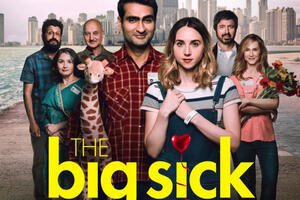We saw the film The Big Sick recently and really enjoyed it. It is based on the real-life story of Pakistani-American comedian Kumail Nanjiani and grad student Emily Gardner get together for a one-night stand but can't convince themselves to leave it at that, try as they might. They fall in love but struggle as their cultures clash. When Emily contracts a mysterious illness, Kumail finds himself forced to face her feisty parents, and to challenge his family's expectations.
I liked this film even though in the first few minutes I was taken aback by how strong it resonated with the acclaimed Netflix series, Master of None, at least for me. Master of None revolves around character Dev Shah, an Indo-American actor, who along the way has a Caucasian girlfriend. Dev is played by Aziz Ansari who just won an Emmy with Lena Waithe for their script writing.
Of course they are different in many respects but in both the film and the series these young men deal with family expectations brought by their parents from their homelands. These include religion, which in both circumstances is Muslim. Both are expected to pray and both end up conceding that their religious observances aren't honest. They have been given the opportunity to flourish in the United States, but that includes the possibility that they will reject customs such as arranged marriage, avoiding alcohol, and regular prayer.
This is the tension faced by many families in different religions, including Christianity. Lots of Millennials have chosen to walk away from church except for high holidays and "hatch, match, and dispatch" occasions. Not long ago evangelicals were somewhat smug about retaining their young people when mainliners had already slipped out the exits. Now their young people are exiting in growing numbers and this is true in both Canada and the United States.
I appreciate the honesty of The Big Sick and Master of None. I wish that congregations could have more realistic conversations about this societal shift, instead of acting as though there are some magic beans we can plant to grow a fresh crop of young'uns.
Have you watched either of these? Why are we so reluctant in families and faith communities to have conversations about a generational shift in religious beliefs?

No comments:
Post a Comment